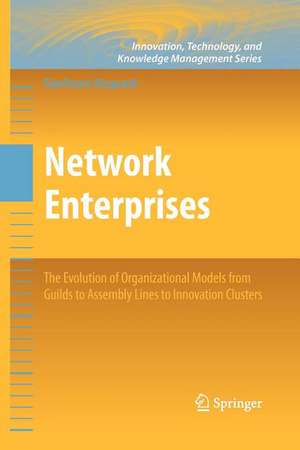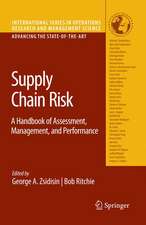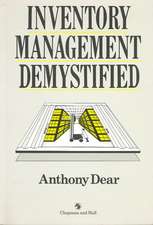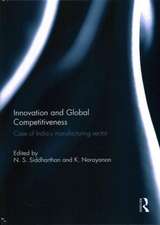Network Enterprises: The Evolution of Organizational Models from Guilds to Assembly Lines to Innovation Clusters: Innovation, Technology, and Knowledge Management
Autor Gianfranco Dioguardien Limba Engleză Paperback – 3 mai 2012
| Toate formatele și edițiile | Preț | Express |
|---|---|---|
| Paperback (1) | 633.02 lei 6-8 săpt. | |
| Springer – 3 mai 2012 | 633.02 lei 6-8 săpt. | |
| Hardback (1) | 639.08 lei 6-8 săpt. | |
| Springer – 14 dec 2009 | 639.08 lei 6-8 săpt. |
Din seria Innovation, Technology, and Knowledge Management
- 15%
 Preț: 643.99 lei
Preț: 643.99 lei -
 Preț: 281.97 lei
Preț: 281.97 lei - 18%
 Preț: 954.62 lei
Preț: 954.62 lei - 15%
 Preț: 653.14 lei
Preț: 653.14 lei - 18%
 Preț: 945.62 lei
Preț: 945.62 lei - 18%
 Preț: 890.54 lei
Preț: 890.54 lei - 15%
 Preț: 640.06 lei
Preț: 640.06 lei -
 Preț: 383.93 lei
Preț: 383.93 lei - 18%
 Preț: 1124.60 lei
Preț: 1124.60 lei - 18%
 Preț: 956.81 lei
Preț: 956.81 lei -
 Preț: 389.49 lei
Preț: 389.49 lei - 15%
 Preț: 655.13 lei
Preț: 655.13 lei - 20%
 Preț: 570.97 lei
Preț: 570.97 lei - 15%
 Preț: 642.03 lei
Preț: 642.03 lei - 18%
 Preț: 941.50 lei
Preț: 941.50 lei - 15%
 Preț: 643.00 lei
Preț: 643.00 lei - 18%
 Preț: 732.52 lei
Preț: 732.52 lei - 15%
 Preț: 637.59 lei
Preț: 637.59 lei - 18%
 Preț: 890.06 lei
Preț: 890.06 lei - 15%
 Preț: 635.47 lei
Preț: 635.47 lei - 15%
 Preț: 638.57 lei
Preț: 638.57 lei -
 Preț: 391.99 lei
Preț: 391.99 lei -
 Preț: 391.99 lei
Preț: 391.99 lei - 15%
 Preț: 632.22 lei
Preț: 632.22 lei - 20%
 Preț: 584.75 lei
Preț: 584.75 lei - 15%
 Preț: 642.18 lei
Preț: 642.18 lei - 18%
 Preț: 894.16 lei
Preț: 894.16 lei - 18%
 Preț: 943.73 lei
Preț: 943.73 lei - 15%
 Preț: 644.49 lei
Preț: 644.49 lei - 18%
 Preț: 947.85 lei
Preț: 947.85 lei - 15%
 Preț: 656.89 lei
Preț: 656.89 lei - 18%
 Preț: 954.45 lei
Preț: 954.45 lei - 18%
 Preț: 1006.72 lei
Preț: 1006.72 lei - 18%
 Preț: 727.31 lei
Preț: 727.31 lei - 15%
 Preț: 642.51 lei
Preț: 642.51 lei - 18%
 Preț: 953.65 lei
Preț: 953.65 lei - 15%
 Preț: 639.59 lei
Preț: 639.59 lei - 15%
 Preț: 645.47 lei
Preț: 645.47 lei - 18%
 Preț: 952.26 lei
Preț: 952.26 lei - 15%
 Preț: 639.08 lei
Preț: 639.08 lei
Preț: 633.02 lei
Preț vechi: 744.73 lei
-15% Nou
Puncte Express: 950
Preț estimativ în valută:
121.13€ • 129.53$ • 100.99£
121.13€ • 129.53$ • 100.99£
Carte tipărită la comandă
Livrare economică 17 aprilie-01 mai
Preluare comenzi: 021 569.72.76
Specificații
ISBN-13: 9781461425281
ISBN-10: 146142528X
Pagini: 144
Ilustrații: XIV, 119 p. 30 illus.
Dimensiuni: 155 x 235 x 8 mm
Greutate: 0.21 kg
Ediția:2010
Editura: Springer
Colecția Springer
Seria Innovation, Technology, and Knowledge Management
Locul publicării:New York, NY, United States
ISBN-10: 146142528X
Pagini: 144
Ilustrații: XIV, 119 p. 30 illus.
Dimensiuni: 155 x 235 x 8 mm
Greutate: 0.21 kg
Ediția:2010
Editura: Springer
Colecția Springer
Seria Innovation, Technology, and Knowledge Management
Locul publicării:New York, NY, United States
Public țintă
ResearchCuprins
Toward a Definition of the “Network Enterprise” Model.- The Complex Nature of the Network Enterprise.- Innovation and Service Provision in the Network Enterprise.- Outline of the History of Organization Doctrines.- The Production Pole: From Fordism to Toyotism.- The Toyota Spirit.- Strategies for the Network Enterprise.- Ethics and Social Values in the Network Enterprise.- The Enterprise Spirit and Culture in the Network Enterprise.- Enterprise Networks.
Notă biografică
Gianfranco Dioguardi is Professor of Engineering at the Politecnico University of Bari, where he teaches Corporate Economics and Organization. His extensive entrepreneurial experience, as CEO and COO of high tech and construction companies, has endowed him with in-depth knowledge of the theory and practice of organizations.
He is the author of a wide range of articles and books (in Italian, French and English) that address management and entrepreneurship, as well as the world of ideas, with particular reference to history, philosophy and science.
Some of the topics presented in this book, such as the concept of "macrofirm", were originally introduced into economics by Dioguardi in 1983 in an ASCE publication. In 1996, the Italian Ministry of Education awarded him the gold medal for outstanding service to the School of Culture and Art, bestowed upon him by the President of the Italian Republic, and in 2001, upon the proposal of the Ministry of Universities and Scientific and Technological Research, he was awarded a similar medal for outstanding service to Science and Culture. Since 1989 he has been a Knight of the Italian Order of Merit for Labor, and since 2004 a Knight of the Legion of Honor of the French Republic.
He is the author of a wide range of articles and books (in Italian, French and English) that address management and entrepreneurship, as well as the world of ideas, with particular reference to history, philosophy and science.
Some of the topics presented in this book, such as the concept of "macrofirm", were originally introduced into economics by Dioguardi in 1983 in an ASCE publication. In 1996, the Italian Ministry of Education awarded him the gold medal for outstanding service to the School of Culture and Art, bestowed upon him by the President of the Italian Republic, and in 2001, upon the proposal of the Ministry of Universities and Scientific and Technological Research, he was awarded a similar medal for outstanding service to Science and Culture. Since 1989 he has been a Knight of the Italian Order of Merit for Labor, and since 2004 a Knight of the Legion of Honor of the French Republic.
Textul de pe ultima copertă
Building on the historical analysis of organizations and theories that have influenced their development, Gianfranco Dioguardi provides an insightful exploration of the network enterprise and its evolution from the Medieval guilds to the present innovation clusters of Silicon Valley, the Research Triangle, Route 128, and other regions in the U.S and around the world. Providing in-depth analysis of production systems and the evolution of "lean manufacturing" principles, Dioguardi integrates history, sociology, management theory, and economics to explore the dynamics of organizations that operate as networks and interact with other firms along the supply chain and in complementary industries. In a technology-enabled environment, the boundaries between products and services and across enterprises become blurred—and create the context for entrepreneurship, innovation, and dissemination of knowledge. Several chapters are devoted to practical concerns of managing the network enterprise, with a particular interest in the ethical and cultural issues. Dioguardi concludes with discussion of the role of the network enterprise in new firm creation and economic growth.
Caracteristici
Explains the evolution of the "network enterprise" as an adaptive, innovative organization, with particular implications for manufacturing, high-tech, and other product-based industries Addresses technological elements within the social context of the organization, with engaging references to history, philosophy, and psychology International coverage, with examples from the US, Europe, and Asia Includes supplementary material: sn.pub/extras

















